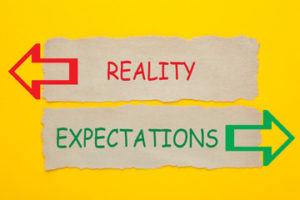We all have expectations. They can be useful in preparing us for events, shaping our mindset and even help us create boundaries, but they stop being useful when they become unrealistic, overly negative or obsessive. This can be a huge source of pain and frustration if we are not able to accept the reality of a situation and adjust accordingly. This article will explore how to strike a balance of expectations vs reality and how to let harmful expectations go.
Expectations are defined as the strong belief or assumption that something is going to happen or should happen a certain way. They can be realistic (balanced & flexible) or unrealistic (unbalanced & rigid) as well as positive or negative. When expectations are positive they can drastically help improve our mindset and outlook, for example an optimist would have generally positive expectations for many situations. An individual who has generally positive expectations will tend to see the opportunity for situations to work out well rather than poorly, for example, ‘’I’ve worked so hard, I think there’s a good chance I’ll get this promotion!’’, this can make a massive difference in how we experience any event or situation.
On the contrary, a person with generally negative expectations will anticipate that most scenarios will work out poorly, for example, ‘’I know they’ll never give me this promotion at work’’. Negative expectations can clearly be very damaging and tend to cause unnecessary stress and anxiety in the build up to most situations, it also creates a pessimistic outlook that dampens our everyday experiences, even when things go well. Having positive but realistic expectations can be a good balance, it allows us to feel that things will generally work out well and that if there are any unexpected challenges or issues that we can adjust and face them.
Expectations can therefore be very useful in preparing our mindset, but what happens when we can’t let our expectations go – even after the situation has passed?

When we find ourselves living through the reality of an event or situation and it is different to what we were expecting, it can bring about many mixed emotions. This is particularly true if we had unrealistic expectations or if we were strongly expecting a particular positive outcome that doesn’t come to be. There can be disappointment, frustration and even anger. For example, perhaps you were expecting to be promoted at work, you felt confident about it and strongly believed it would happen – suddenly when it doesn’t, it’s not only disappointing but it’s quite a shock.
Or perhaps you expected a family member to behave in a certain way during a family crisis and they didn’t – again it can be upsetting and leave you feeling resentful. These mixed emotions when something doesn’t turn out the way we expect is totally normal. However it becomes unhealthy when we can’t let our expectations go and accept the reality of the situation. But why?
When we fixate on what we were expecting to happen rather than accepting what has happened, it can create a painful cycle of disappointment, anger and frustration. These emotions in the long-term don’t serve us in any way and only lead to drain emotional energy. In addition, when we can’t accept the reality of what has happened we tend to overlook other opportunities that arise and it can leave us trapped in the past. For example, if we fixate on the missed job promotion long after its happened, we can overlook other exciting prospects happening in our career around us.
Or, in the second example, if we can’t accept that our family member acted differently to how we had expected or hoped, it can lead to a long term strain in the relationship as we quietly resent them for months or even years to come.
Accepting the reality of what has happened doesn’t mean you can’t feel disappointed by the outcome, it simply means you can acknowledge that it turned out differently than you expected, accept the feelings this brings up, adjust your plan and move on. Not only is this freeing but it allows you to capture new opportunities that you may miss otherwise. Ruminating in what could have been is a painful cycle that leads to nowhere. The aim is to have positive but realistic expectations that allow you to feel hopeful yet adaptable to whatever may come. If you struggle with striking this balance, introducing a calming mantra that applies to all situations can be extremely helpful, for example, ‘’However this turns out will be ok ’’. Striking this balance in our expectations can take time but it is something that can reduce anxiety, improve your mindset and free you from your past.
The article is written by Lauren, Trainee Counsellor at The DMC Clinic. If you would like to discuss how any of the topics mentioned above are impacting your mental health, please contact The DMC Clinic to arrange an appointment.









